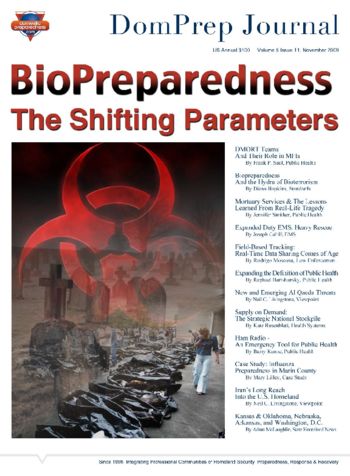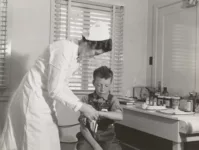

DMORT Teams and Their Role in MFIs
Frank P. Saul
November 24, 2009
Recent-year increases in the number of mass-fatality incidents, combined with the increasingly bizarre nature of some of those incidents, have led to the formation of specially trained medico-legal teams to deal with the on-site aftermath. This is their story, which is more complicated, and sophisticated, than anything seen on national television.

Expanding the Definition of Public Health
Raphael M. Barishansky
November 24, 2009
The field of medicine has come a long, long way from the early 20th-century tradition of family doctors, homespun remedies, and much lower life expectancies. People are healthier today, and usually live longer lives, but the technology of terror also has grown exponentially, creating a need for a new public-health priority: emergency preparedness.

Iran’s Long Reach Into the U.S. Homeland
Neil C. Livingstone
November 24, 2009
Despite U.S. moves to improve nation-to-nation relations with Iran, Tehran continues to support
groups and organizations obviously unfriendly to the United States – the Alavi Foundation, for example.
It is clear, moreover, that the anti-U.S. virus is spreading, with Somalia and other countries joining
the international junta facing the free democracies of the world.

Supply on Demand: The Strategic National Stockpile
Kate Rosenblatt
November 18, 2009
One of the most important, best managed, but only theoretically “secret” weapon in the U.S. defense arsenal is the Strategic National Stockpile (of medicines, pharmaceuticals, and other life-saving goods and materials needed to counter biological and/or chemical “incidents,” including terrorist attacks). Fortunately, this weapon is designed to save lives, not destroy them.

Case Study: Influenza Preparedness in Marin County
Mary Lilley
November 18, 2009
Something like an earthquake – not as loud or as immediately terrifying, but longer lasting and immensely more lethal. That is more or less how the leaders of California’s Marin County viewed the approach of the H1N1 pandemic, and why they were so determined to take whatever measures were needed to limit its impact.

Biopreparedness and the Hydra of Bioterrorism
Diana Hopkins
November 11, 2009
Science is wonderful! Except when it is not. One of the almost inevitable problems facing researchers in the biological sciences is how to ensure that their discoveries are used to benefit mankind. Unfortunately, achieving that enviable goal may be a true Mission Impossible.

Mortuary Services & The Lessons Learned From Real-Life Tragedy
Jennifer Smither
November 11, 2009
First responders do their utmost to save the lives of those seriously injured in mass-casualty incidents. Medical examiners and local volunteers have what is sometimes a more difficult job: identifying the bodies, “processing” the remains, and notifying the victims’ families.

New and Emerging Al Qaeda Threats
Neil C. Livingstone
November 11, 2009
The term “global war on terrorism” is now politically incorrect, in at least some circles. There is
mounting evidence, though, that some terrorists do not agree and are already planning new attacks
against domestic targets on the U.S. homeland.

Ham Radio – An Emergency Tool for Public Health
Barry Kanne
November 4, 2009
Many citizens served their communities heroically in the aftermath of Hurricane Katrina, and some of their stories are well known – but most of them remain untold. One of the

Field-Based Patient Tracking: Real-Time Data Sharing Comes of Age
Rodrigo (Roddy) Moscoso
November 4, 2009
The old saying that the job “”isn’t done until the paperwork has been completed”” is particularly true if the “paperwork” data – vital signs, indications of internal bleeding, etc., collected at the scene of a car accident or other incident – is somehow lost before, during or after the patient’s arrival at the hospital.

